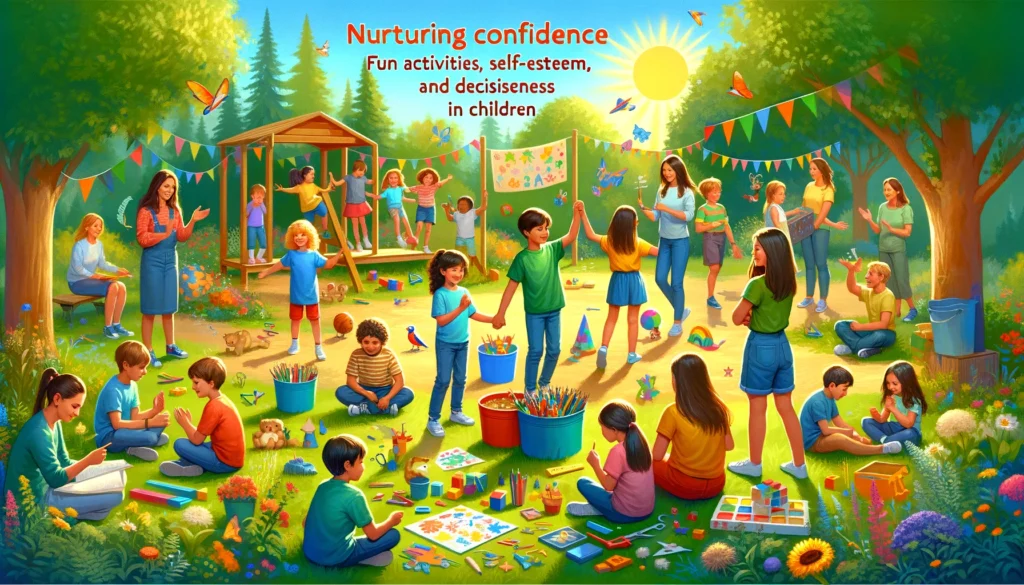In the intricate tapestry of childhood, building trust, confidence, self-esteem, and decisiveness are crucial threads that shape a child’s journey towards personal growth and social success. Through engaging games and activity-based methods, parents and educators can foster these essential traits, laying a strong foundation for a child’s future.

At LifeAdve, we understand the significance of nurturing these qualities in children. Our organization is dedicated to enhancing relationships and personal development across life stages, offering workshops and excursions that utilize nature-based activities to foster emotional intelligence, communication, and well-being.
Building Trust, Confidence, Self-esteem, and Decisiveness:
- Team Building Games:
– Examples: Trust falls, team-building exercises, and collaborative games.
– Advantages: Encourages teamwork, builds trust in peers, and instills confidence through shared achievements.
- Problem-solving Activities:
– Examples: Puzzle games, escape room challenges, and strategy games.
– Advantages: Enhances decision-making skills, boosts problem-solving abilities, and promotes a sense of accomplishment.
- Role-playing Games:
– Examples: Acting, storytelling, or scenario-based games.
– Advantages: Builds self-esteem by encouraging creativity and self-expression, helps children explore different perspectives, and boosts confidence through role-playing.
- Communication Games:
– Examples: Charades, group discussions, and communication skill-building activities.
– Advantages: Improves verbal and non-verbal communication skills, fosters self-confidence in expressing thoughts, and promotes active listening.
- Outdoor Adventure Activities:
– Examples: Hiking, camping, or adventure sports.
– Advantages: Builds resilience, instills a sense of accomplishment through overcoming challenges, and enhances decision-making skills in real-life situations.
- Mindfulness and Relaxation Activities:
– Examples: Yoga, meditation, or breathing exercises.
– Technique: Introduce mindfulness exercises like deep breathing or simple meditation to help your child become aware of their emotions without judgement.
– Advantages: Promotes emotional regulation, reduces stress, enhances self-awareness, and promotes a positive self-image.
Advantages of Games and Activity-based Methods:
- Engagement and Enjoyment: Games make the learning process enjoyable, ensuring active participation and engagement among children.
- Hands-on Learning: Activity-based methods provide a hands-on approach to learning, allowing children to experience concepts firsthand.
- Holistic Development: Integrating various activities addresses multiple aspects of a child’s development, including physical, emotional, social, and cognitive skills.
- Building Social Skills: Collaborative games encourage teamwork, cooperation, and effective communication, fostering positive social interactions.
- Boosting Confidence: Success in games and activities contributes to a child’s sense of accomplishment, thereby boosting confidence and self-esteem.
- Critical Thinking and Decision-making: Problem-solving games enhance critical thinking skills, while decision-making activities provide practical experiences for making choices.
- Long-lasting Impact: Positive experiences during childhood activities can have a lasting impact, shaping a child’s personality and approach to challenges in the future.
Incorporating a variety of games and activities into educational settings helps create a supportive environment for children to develop essential life skills while having fun. With the right tools and guidance, parents and educators can nurture a generation of confident, resilient, and decisive individuals ready to tackle life’s adventures.
FAQs:
- How can parents incorporate these activities into daily routines?
Parents can schedule regular family game nights, outdoor adventures on weekends, and incorporate mindfulness exercises during bedtime routines, fostering trust, confidence, and decisiveness in children through fun and engaging activities.
- Are these activities suitable for children of all ages?
Yes, the activities mentioned can be adapted to suit children of various ages, ensuring inclusivity and engagement across different developmental stages.
- How do these activities benefit children’s overall development?
These activities promote teamwork, problem-solving skills, communication, and resilience, contributing to holistic development and nurturing essential life skills in children.
- Can these activities be implemented in educational settings?
Absolutely, these activities can be integrated into school curriculums, after-school programs, and extracurricular activities, providing hands-on learning experiences that complement traditional teaching methods and promote social and emotional growth.
